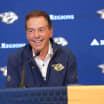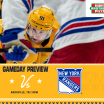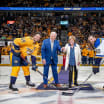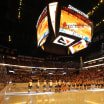Less than two weeks removed from standing behind the bench in Game 7 of the American Hockey League's Calder Cup Finals, Karl Taylor found himself outside of the Predators locker room at Bridgestone Arena, the Nashville logo draped behind him.
It was quite a transition in such short order, leaving the Texas Stars - a team he had served as an assistant coach with for the past four seasons - but a chance had arisen to become the boss of his own club once more. There was a vacancy in Milwaukee that needed filling, and it didn't take Predators General Manager/President of Hockey Operations David Poile, Predators Director of Player Development/Milwaukee General Manager Scott Nichol and Predators management long to decide Taylor was the right man for the job.
On June 29, the 47-year-old native of North Bay, Ontario, became the seventh head coach in Admirals' history, the next to be tasked with developing players at the AHL level to become mainstays in the NHL, specifically in Nashville.
Taylor Tasked with Developing Future Preds in Milwaukee
New Admirals Head Coach Karl Taylor Set to Continue Tradition Between Milwaukee and Nashville


















